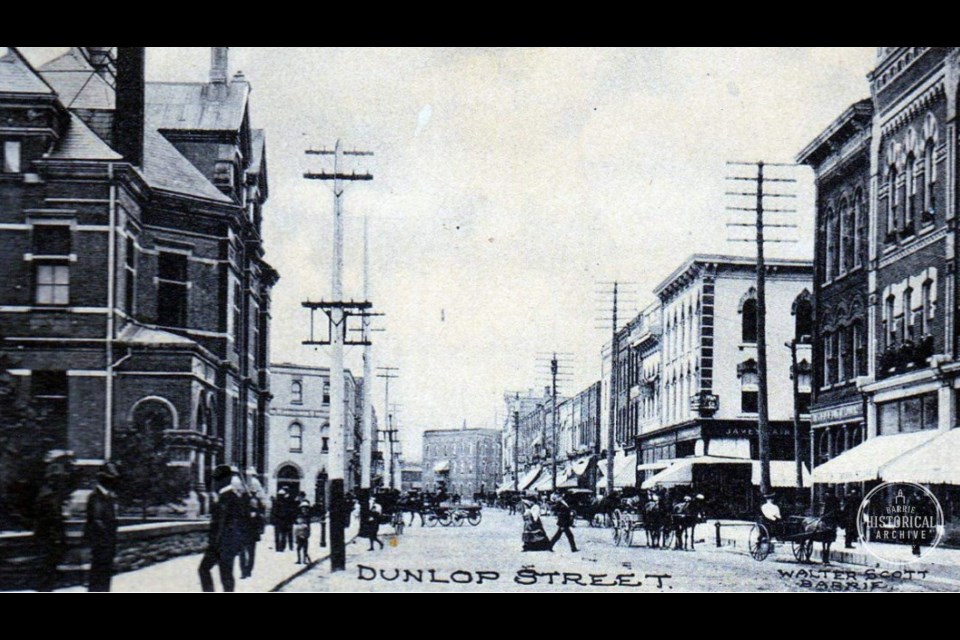All sorts of manufacturing companies have tried to get a foothold in this town over the years.
New industry has long been the sign of a prosperous and thriving community, so the town of Barrie encouraged anyone with a solid idea to give it a go.
Work for the people and dollars for the municipal tax coffers were always more than welcome. This town has seen the manufacturing of shoes, cigars, carriages, doors and window frames, straw hats, and beer, to name just a few products.
In 1899, a new company was formed to provide locally made wicker furnishings, which were all the rage in Victorian homes at the time.
“Under the name of the Barrie Wickerwork Manufacturing Co. Limited, a new industry has begun in Barrie. The object of the company is the manufacture and sale of wickerwork chairs, baskets and furniture of every description. The company has just been incorporated but has already manufactured a quantity of beautiful wickerwork which may be seen on the premises on the front street just west of the Five Points.”
This Northern Advance ad from Nov. 9, 1899, also mentioned the key players. These gentlemen were extremely well known in the community.
“The promoters and shareholders are H.H. Strathy, J.H. Plummer, G.H. Esten, Samuel Wesley, O.H. Lyon and John Rogerson.”
Strathy was a Crown prosecutor with a Gowan mother and an Ardagh wife. Esten was his law partner. Wesley was the publisher of the Northern Advance, while Rogerson owned an insurance firm. Plummer made his money in banking, while Lyon was a man of many talents, having been involved in everything from captaining steamboats to managing a loan company.
A most important name was omitted, though — that being the name of a man without whom the company could not likely exist: Isaac Prince.
Prince arrived in Barrie in 1895 with his wife, Ellen Dredge, and their nine children.
The family originated in Downton, England, which is located on the marshy edges of the Avon River in the County of Wiltshire. Basket making and wickerwork had been part of the local economy for centuries due to the ready supply of reeds.
However, in 1835, the Downton economy went into a sharp decline. The townsfolk consulted both the Poor Law Commission and an emigration agency to help them out. Soon, more than 10 per cent of the community sailed away to Canada. Among the names on the passenger list for the ship King William were members of the Dredge and Prince families of Downton.
Isaac and his wife, Ellen, were born in Downton a decade afterward, but they would have heard the stories of those relatives who had earlier gone off to that new land, Canada.
Isaac set himself up as a wicker worker after arriving in Barrie. It may not have been long before his natural talent, possibly generations in the making, caught the attention of these wealthy investors.
The Barrie Wickerwork Manufacturing Co. did well for a time. The high-quality pieces turned out by Isaac Prince, assisted by his son, Ernest, were popular with customers who came to the combination factory and shop on Elizabeth Street. In fact, extra hands had to be hired to keep up with the demand during the early days of the venture.
By 1915, the wickerworks was still going but on a smaller scale. Half of the original investors had died, and Lyon was the only remnant of the founders still actively promoting the business.
Lyon had gone to the length of having a new wicker factory built behind his own home on the corner of Owen and Sophia streets. The showroom was dispensed with and the exclusive selling right for Barrie Wickerwork products was awarded to George Vickers’s department store.
It is not clear when the Barrie Wickerwork Manufacturing Co. met its end. Isaac Prince died in 1923, although his son, Ernest, had become a skilled wicker man in his own right.
Oliver Hammond “O.H.” Lyon died in 1929 and the wickerworks likely faded from this town around the same time.
Each week, the Barrie Historical Archive provides BarrieToday readers with a glimpse of the city’s past. This unique column features photos and stories from years gone by and is sure to appeal to the historian in each of us.



